Joe Biden
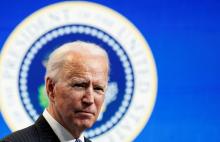
Throughout his presidential campaign, Joe Biden said he would restore America’s role as a “leader” in refugee resettlement. And despite a discouraging start on fulfilling that promise, faith leaders and other advocates for refugees are determined to hold him to his commitment.
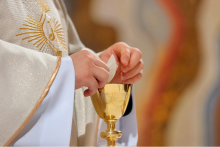
Cardinal Wilton D. Gregory of Washington, D.C., has said that he would not deny Biden Communion; Rev. C. Kevin Gillespie, pastor of Biden’s home parish in Washington, Holy Trinity Catholic Church, agreed with that decision.

After graduating during the Great Recession, which also coincided with his divorce, Derek Williams struggled to build his fledgling private practice and make ends meet. He told Sojourners there were times when he was unable to pay for simple necessities, let alone meet his regular student loan payments.

I FIND MYSELF thinking about the significance of “firsts,” the role of faith in the morality of the nation, and the place of race and gender in that project. Vice President Kamala Harris’ ascent to one of the highest seats of political power is historic, unprecedented, and awe-inspiring. Like Barack Obama before her, it is a first that has ushered in, for many, a renewed faith in the nation. Multiply the emotional impact of that first by whatever number captures the firestorm of the past four years, and that faith easily transforms into a belief that “morality” has been secured and that things are going to be, basically, okay.
This train of thought is, I believe, dangerous and wrong. I do not discount the feelings Harris evokes. The emotional impact of Harris’ election registers for me very personally as a Black woman. When I initially heard that Joe Biden and Kamala Harris had won the election, my first thought was exhilarated shock at Trump’s defeat. Then, as that fact sunk in, I realized that this outcome meant the election of a woman of color—a Black woman, a woman of South Asian descent—to the vice presidency of the United States. Weeks later, the words still seemed somewhat strange, as if my brain was having trouble wrapping itself around the reality. My inability to readily speak her new position reflects to me the depth of her significance, and the change it portends for how I and future generations of Black and brown girls and women will be able to envision and speak of ourselves. I pause, however, at the unexamined triumphal connections being made between Harris, morality, and political futures.
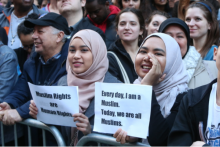
For Muslim religious and political leaders, President Joe Biden’s inauguration ends the “nightmare” of the Trump administration; nevertheless, Muslim leaders remained cautious in expressing optimism about the Biden administration’s promises.

On his first day as president, Joe Biden followed through on one of his pre-inaugural commitments: re-entering the United States into the Paris climate agreement.
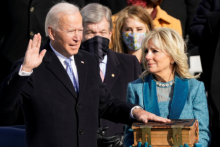
“Saint Augustine, a saint of my church, wrote that a people was ‘a multitude defined by the common objects of their love,’” Biden said. “What are the common objects we, as Americans, love, that define us as Americans? I think we know: opportunity, security, liberty, respect, honor, and, yes, the truth.”
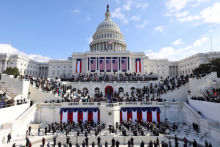
At President Joe Biden’s inauguration, Rev. Leo O’Donovan, SJ, invoked the “Holy Mystery of Love” to be with us “as we dream together.”

Shortly before Joe Biden was sworn in as the 46th president of the United States, Rev. Leo O’Donovan, SJ, a longtime friend and mentor of President Biden's, delivered this prayer.
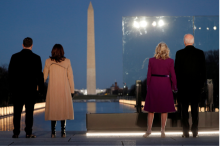
As the U.S. crossed the threshold of 400,000 deaths from COVID-19, President-elect Joe Biden and Vice President-elect Kamala Harris spoke at the country’s first national memorial service for coronavirus victims.
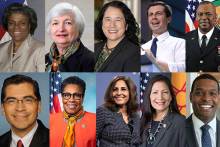
President-elect Joe Biden has promised to have the “most diverse Cabinet” in U.S. history, but is the Cabinet religiously diverse? The answer, experts explain, must go beyond tracking the identities of various appointees; a diverse administration must have the power to impact policy for the communities they represent.
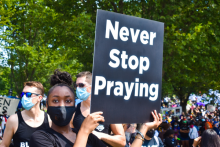
As the Inauguration Day nears, one thing is clear: The U.S. needs as many prayers as possible. Here are places where you can pray virtually, both before and after new elected officials take office.
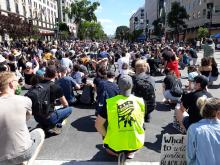
Ahead of President-elect Joe Biden’s inauguration, monuments are fenced off, streets are closed and 20,000 National Guard members are positioned around Washington, D.C. But some local organizations are more focused on the safety of Washingtonians — especially the safety of Black and brown Washingtonians who may be at greater risk of being targeted by right-wing groups, many of which have ties to white nationalism.
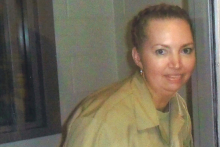
In the early morning of Jan. 13, following a day of attempted legal delays and despite documentation of severe mental illness stemming from childhood abuse, 52-year-old Lisa Montgomery became the first woman in decades to be executed by the federal government.

The FBI has warned of possible armed protests being planned for Washington, D.C., and at all 50 U.S. state capitals in the run-up to President-elect Joe Biden's inauguration on Jan. 20, a federal law enforcement source said on Monday.

HOW ABOUT NOW? Now can we exhale? Confident that our democracy is still clinging above the precipice of failure, its fingers sore from gripping an outcrop holding our country together, its legs dangling over the jagged stones of dictatorship below [almost finished with the metaphor], its feet clawing for a foothold of common ground, even though feet actually don’t claw, but I can’t think of the verb that feet do.
Anyway, Joe Biden won the election and finally countered that hurtful nickname of “Sleepy” by staying awake for most of his inauguration. Chief Justice John Roberts did his part by respectfully stifling a giggle when administering the oath of office to a man facing a Supreme Court that could nullify any action he takes. And none of the television cameras picked up Roberts mouthing “6 to 3, baby!”
It was a nice ceremony, marred only by Rudy Giuliani rushing the stage, waving documents and shouting something about fraud that nobody heard because we were distracted by how much he looks like a crazed jack-o’-lantern. Other than that, the nation finally celebrated a president who will usher in our long-awaited renewal. (But it turns out ushers only have the skills to separate friends of the bride and groom, so we turned off the television and resumed staring at the same four walls we’ve been looking at since March.)

AS THE BIDEN administration enters the White House, it must focus not only on repairing the damage caused by four years of the Trump administration but also push forward a bold agenda using all available channels: unilateral executive actions, the rule-making process, and collaboration with Congress. Here’s a wish list for the first 100 days.
While we await mass distribution of a COVID-19 vaccine, Americans are living through some of the highest infection and death numbers we’ve seen at any point in the pandemic. A coordinated national response to the coronavirus must be a top priority for the administration. This includes a national mask mandate, a robust and coordinated federal strategy, a national vaccine distribution strategy, and additional support and stimulus to individuals, health systems, and states to address the health and economic impacts of the disease.
While the wealthy and those with stocks and investments have only seen their wealth increase over the past year, the gap between the richest and poorest Americans has expanded dramatically. A progressive economic agenda is needed to bolster and support those with low and middle incomes (roughly 80 percent of Americans). The priorities should include rolling back tax cuts for the wealthiest; forgiving federal student debt; increasing the federal minimum wage; ensuring access to paid sick and family leave and affordable child care; modernizing unemployment insurance; and introducing a budget that supports safety net programs and invests in the people and communities struggling the most.

IN HIS FIRST speech as president-elect, Joe Biden outlined four priorities his incoming administration plans to address: systemic racism, the COVID-19 crisis, climate change, and economic hardship and recovery. I am encouraged not just by the breadth of policy detail and ambition in his Build Back Better platform but also by the radically different narrative for the nation and its future. These four pillars should resonate for people across the diversity of the church, and they will require that we generate significant political will, urgency, and accountability within the new administration and Congress to achieve progress on these priorities and more. Along with policy reforms, we also face an imperative to renew our broken and toxic political culture.
In the gospel of Matthew, Jesus proclaims, “Every kingdom divided against itself is brought to desolation, and every city or house divided against itself will not stand” (Matthew 12:25). This profound truth is relevant for the church and for the nation.

“We see giving women access to reproductive health care as being pro-life,” Manson said of Catholics for Choice, which was founded in 1973 by Catholics who believe that the faith tradition supports a person’s right to follow their conscience on matters of their own reproductive health.
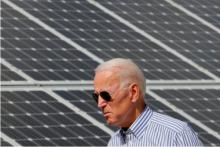
“We have to end fracking. Biden knows it,” Rev. Fletcher Harper said.